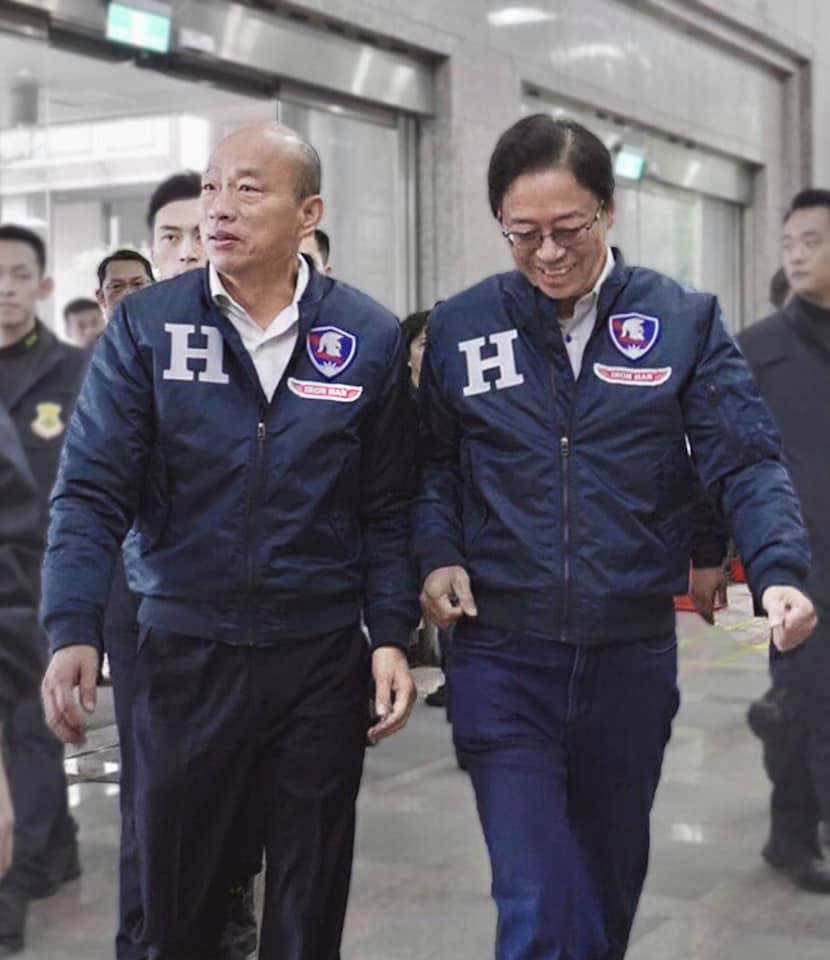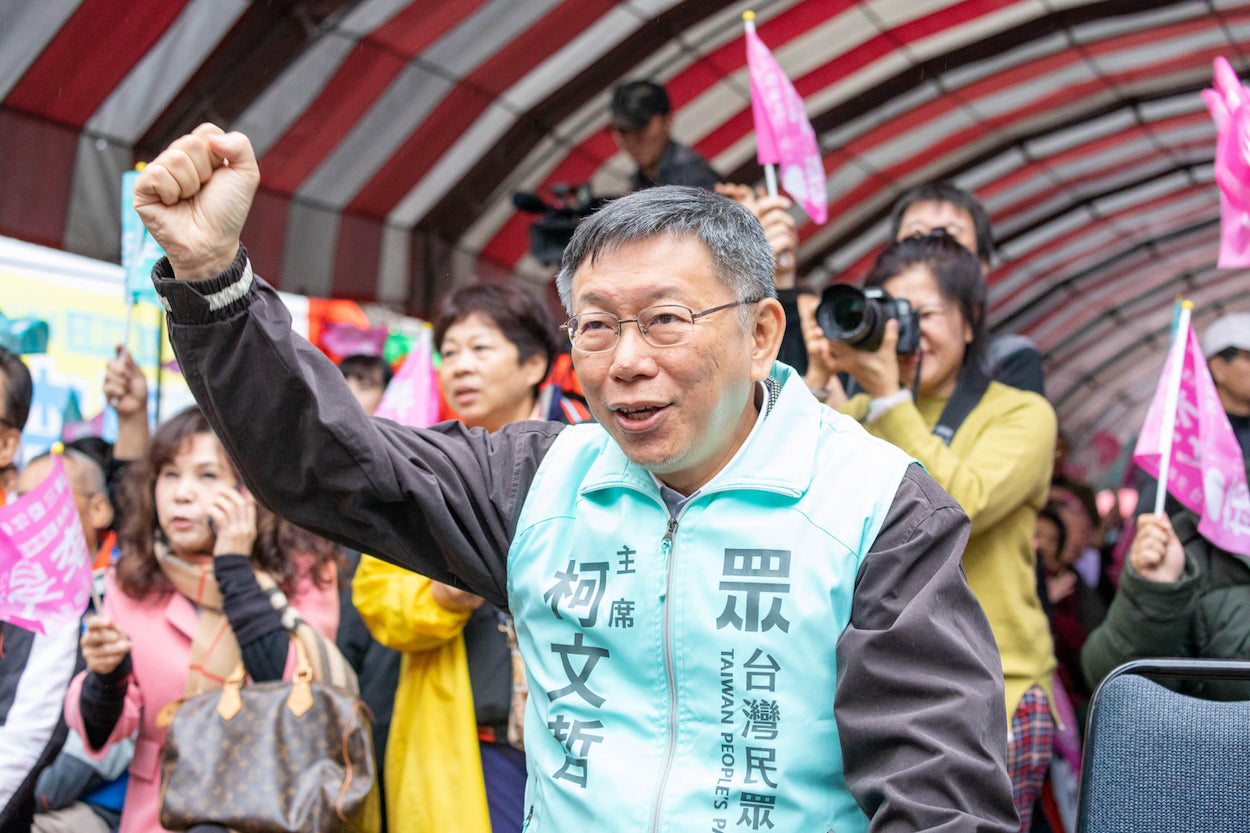by Brian Hioe
語言:
English
Photo Credit: 韓國瑜/Facebook
IN EXAMINING many of the prominent male politicians playing important roles in 2020 elections, a striking commonality is their frequent overt displays of misogyny, racism, and homophobia. This is true of individuals including but not limited to Kaohsiung mayor Han Kuo-yu, the KMT’s presidential candidate, his running mate Simon Chang, KMT chair Wu Den-yih, and Taipei mayor Ko Wen-je, who is not running for president but whose Taiwan People’s Party (TPP) will be fielding a number of legislative candidates in 2020 elections. However, for the sake of this article, we will confine our discussion to these four individuals.
 Kaohsiung mayor and KMT presidential candidate Han Kuo-yu (left) and his running mate Simon Chang (right). Photo credit: 韓國瑜/Facebook
Kaohsiung mayor and KMT presidential candidate Han Kuo-yu (left) and his running mate Simon Chang (right). Photo credit: 韓國瑜/Facebook
As the KMT’s presidential candidate, Han Kuo-yu has attracted no small amount of attention for misogynistic or sexist comments such as “A mature woman is like a bowl of soup while you’re cooking, you should drink it quickly while it’s still warm, otherwise you’ll get burnt”, claiming that “Men’s lives are in the bottom halves of their bodies, while women’s are in their upper halves,” or stating that the economy of Kaohsiung was comparable to someone who has been “castrated”. Han has also provoked controversy for comments tinged with racism, such as by claiming that Taiwanese would never accept “Marias,” an ethnic slur for Filipina women in Taiwan, teaching English in Taiwan, and comparing new migrants to Taiwan to “chickens” who had come to roost, with brain drain having robbed Taiwan of “phoenixes.”
Han’s running mate, Simon Chang, has not proven much better, making homophobic comments such as “Given that homosexuality has physiological causes, we can accept them, but we should not necessarily encourage them”, or claiming that “Women who have not had children can never understand the feelings of their parents.” The latter comment was lashing out at President Tsai Ing-wen for having no children of her own and suggesting that this made Tsai unfit to be the leader of Taiwan, due to what Chang claimed was her lack of a stake in society. That being said, one notes that many female KMT politicians also do not have children.
KMT chair Wu Den-yih, too, has echoed misogynistic comments by Han and Chang, by referring to Tsai as an “ill-starred woman”, a sexist term in Taiwan, and referring to Presidential Office secretary-general and former Kaohsiung mayor Chen Chu as a “fat sow.” Wu has refused to retract his comments after being accused of sexism.
To this extent, Taipei mayor and TPP chair Ko Wen-je, who shares with Han a reputation for frequent gaffes, has also made a large number of misogynistic comments over the years. This includes stating that “If there are too many women in an industry, that reflects that that industry is in a downturn,” saying that “That thirty percent of women over thirty are unmarried is a crisis of national stability”, claiming that women without their make-up are “scary”, and denigrating gynecologists for working with “holes” in the bodies of women.
 Taipei mayor and TPP chair Ko Wen-je. Photo credit: 柯粉俱樂部/Facebook
Taipei mayor and TPP chair Ko Wen-je. Photo credit: 柯粉俱樂部/Facebook
Like Wu, Ko has made body-shaming comments directed at Chen Chu, one of Taiwan’s most prominent female politicians and an instrumental figure in the Taiwanese democracy movement, by claiming that she was a “fatter version of Han Kuo-yu.” Indeed, Ko has a history of denigrating female politicians. Ko provoked controversy in 2014 after commenting that KMT Chiayi mayoral candidate Chen Yi-chen, a former journalist and television broadcaster, was “pretty” and that, consequently, she would be better suited to “working behind a counter” than running for public office.
In consideration of that Han Kuo-yu and Simon Chang are the KMT’s presidential and vice-presidential candidates, and that Wu Den-yih is the chair of the KMT, one observes a broader pattern of misogyny by leading KMT politicians. From this, one might draw the conclusion that the KMT, one of Taiwan’s two major political parties, remains deeply bigoted internally toward immigrants to Taiwan, members of the LGBTQ community, and women.
However, to the extent that Han Kuo-yu, Wu Den-yih, and Ko Wen-je are all among Taiwan’s most significant male politicians at present, perhaps this reflects that Taiwan is far from some utopia when it comes to issues of race, gender, and sexuality. Despite that Taiwan has made strides in past years with the presidency of Tsai Ing-wen, Taiwan’s first female president, and the legalization of gay marriage earlier this year, the Taiwanese political landscape continues to be one in which politicians such as Han, Wu, Chang, and Ko can continue to make misogynistic, racist, and homophobic remarks while remaining central political figures in Taiwanese politics.

